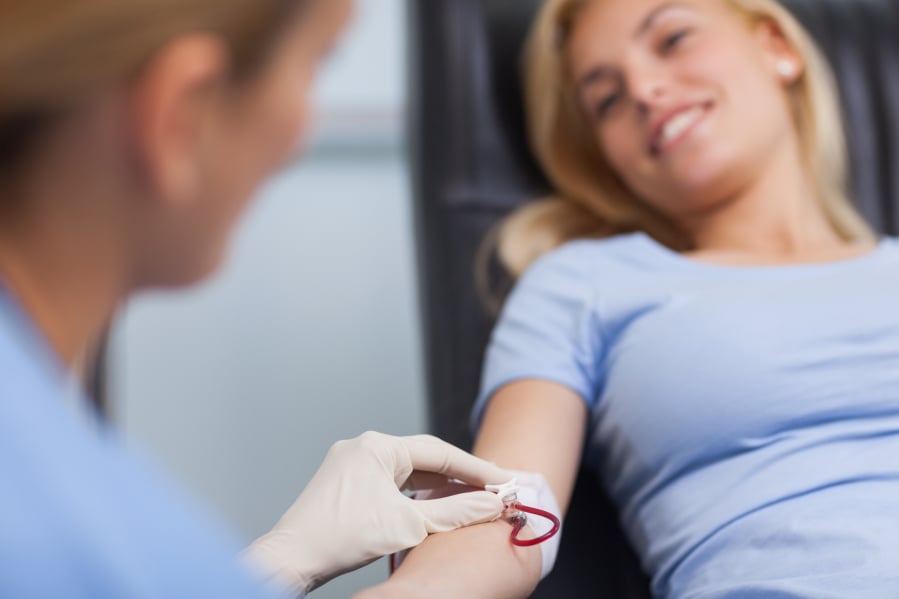Millennials are at it again.
We know the generation is responsible for the impending demise of paper napkins, yogurt and liquid fabric softener. They’re killing the housing market because they’re not buying homes. And their refusal to get married is hitting the diamond industry hard.
Now, they’re not donating blood — at least not at the rate they think they are. A new national study, conducted by Harris Poll on behalf of Bloodworks Northwest, shows that 47 percent of young adults, those 18 to 34 years old, believe they are more likely to donate blood that older people. The reality: Millennials account for only 20 percent of blood collections.
But that doesn’t mean millennials don’t want to help, said Dr. Jim AuBuchon, president and CEO of Bloodworks Northwest. In the aftermath of tragedies, such as the recent Amtrak derailment in DuPont and the Las Vegas shootings, millennials show up in force.
“I’m not going to bash millennials,” AuBuchon said. “I appreciate their support.”
But the low number of younger donors does concern AuBuchon. As current donors age and their numbers shrink, there needs to be people to fill the void, he said.
How to Help
• In Washington, anyone who is in good health, at least 18 years old and weighs at least 110 pounds can donate blood. High school students 16 and 17 years old who meet weight requirements — 114 pounds for males, 125 pounds for females — can donate with a permission form signed by their parent or guardian.
• Whole-blood donors can give once every 56 days. Platelet donors can give once every seven days, up to 24 times per year. Plasma can be donated once every 28 days, up to 13 times a year.
• To schedule an appointment at the Bloodworks Northwest Vancouver donor center, 9320 N.E. Vancouver Mall Drive, Suite 100, call 800-398-7888 or visit schedule.bloodworksnw.org
“We need to figure out new ways, better ways, to connect with younger adults so we can ensure we have an adequate blood supply,” AuBuchon said.
Bloodworks Northwest, and blood banks across the country, have great support from high-schoolers, AuBuchon said. In fact, about one-fifth of the nation’s blood supply comes from them. But those young donors have begun to disappear when they go off to college or start a career or a family, AuBuchon said.
“To some degree, we’re a victim of our own success,” he said.
Bloodworks, which provides blood products to both Vancouver hospitals, is able to supply adequate amounts of blood products on an ongoing basis, AuBuchon said. There aren’t chronic shortages or regular pleas in the media for donations, he said.
Older generations, however, came of age when blood transfusions were becoming an everyday medical procedure and community blood banks were a new phenomenon. The need for blood was in the forefront and donating was seen as a civic duty, said AuBuchon, who is a baby boomer.
So Bloodworks Northwest is faced with the challenge of inspiring that civic duty among millennials. And tasked to lead the effort is Kyle Boynton, a 29-year-old program manager for donor engagement at Bloodworks.
Boynton first donated blood at the request of a friend whose mom was fighting cancer. That personal invitation led to Boynton becoming a regular donor and served as an example of how to reach his generation, he said.
“It’s all about finding those personal connections and going out to where the millennials are and spreading the word about the importance of it,” Boynton said.
Bloodworks has launched several mobile recruitment programs aimed at millennials. For example, the nonprofit has partnered with local breweries — among them, Heathen Brewing in Vancouver — to offer pint-for-pint events, which offer donors a free pint of beer in exchange for a pint of their blood.
In Seattle, the organization has sponsored trivia nights, full of blood-related questions, at breweries. At one recent event, 30 people signed up to donate at the event, Boynton said.
Bloodworks has also started attending events that attract millennials — the Seattle Tattoo Expo, Portland’s Waterfront Blues Festival and the Emerald City Comic Con, for example — and offering free blood typing.
“That’s one of the first things people ask when they donate, ‘Will I find out my blood type?'” Boynton said. “We took that idea and figured out a way to do it.”
People visiting the booth can find out their blood type with just a poke of their finger. And while they wait four minutes for results, Bloodworks staff tell them about the importance of blood donation and direct them to the website to schedule a donation appointment, Boynton said.
Did You Know?
• Every minute, someone in the Northwest needs blood.
• One-third of adults will need a blood transfusion at some point in their lifetime.
• The shelf life for red blood cells is 42 days, and for platelets, just five days.
• Bloodworks Northwest needs 800 donors per day to maintain its supply for 90 hospitals in the Northwest.
Source: Bloodworks Northwest
The response to these outreach efforts has been positive, Boynton said. But whether they’ll become regular donors remains to be seen.
One thing is for certain: The need is not going away.
“This is an ongoing need,” Boynton said. “We need to have blood donors, and we need to engage in this group.”




